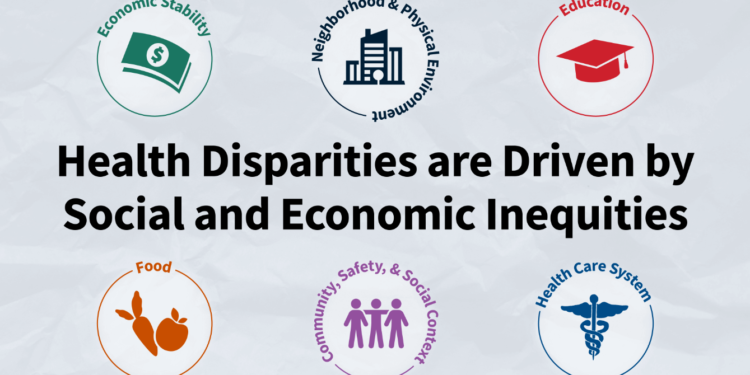Img source: KFF.org
June 11, 2024 Story by: Editor
A recent report by KFF (Kaiser Family Foundation) sheds light on the persistent health and healthcare disparities among various racial and ethnic groups in the United States. These disparities are influenced by a complex interplay of social, economic, environmental, and systemic factors.
| Note: The measures presented are for the most recent year with available data. “Better” or “Worse” signifies a statistically significant difference from White individuals at the p<0.05 level. “No difference” indicates no statistically significant difference. “Data limitation” means there is no separate data for a racial/ethnic group, insufficient data for a reliable estimate, or comparisons are not possible due to overlapping samples. AIAN refers to American Indian or Alaska Native. NHPI refers to Native Hawaiian or Pacific Islander. Hispanic individuals may be of any race but are categorized as Hispanic for this analysis; other groups are non-Hispanic. |
Key Takeaways:
- Health Insurance Coverage: There are significant disparities in health insurance coverage among different racial and ethnic groups. Black Americans, along with other minority groups, have lower rates of health insurance coverage compared to their White counterparts. This gap is a critical barrier to accessing necessary healthcare services.
| Graph source: KFF |
- Access to Healthcare Services: The report highlights that Black Americans often face difficulties in accessing healthcare services. Factors contributing to this issue include geographic barriers, socioeconomic status, and systemic biases within the healthcare system.
- Health Outcomes: Disparities in health outcomes are evident, with Black Americans experiencing higher rates of chronic diseases such as hypertension, diabetes, and heart disease. These conditions are exacerbated by limited access to preventive care and early intervention services.
- Quality of Care: The quality of healthcare received by Black Americans is often lower compared to other groups. This includes differences in the treatment provided, patient-provider interactions, and overall healthcare experiences. Structural racism and implicit biases within the healthcare system contribute to these disparities.
- Social Determinants of Health: The report emphasizes the role of social determinants of health, such as housing, education, and employment, in shaping health outcomes. Black Americans are disproportionately affected by adverse social determinants, which hinder their ability to achieve optimal health.
- Policy Implications: Addressing these disparities requires targeted policy interventions. The report calls for comprehensive strategies that include expanding health insurance coverage, improving access to care, addressing social determinants of health, and combating systemic racism within the healthcare system.
KFF’s analysis underscores the need for ongoing efforts to reduce health disparities and promote health equity. The data presented in this report highlights the urgency of addressing the root causes of health inequities to ensure that all individuals, regardless of race or ethnicity, have the opportunity to achieve their highest possible standard of health.
Source:
















